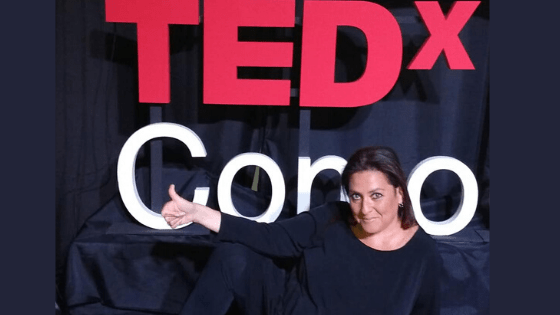Laura Lewin is a teacher training guru and the founder of ABS International, a leading company in educational seminars and classes. Based out of Buenos Aires, Argentina, Laura has authored nine books for educators, parents, and students. In 2018, she gave a TEDx Talk on the importance of focusing on learning over grades, and she has presented at TESOL conferences throughout South America and beyond. Laura frequently hosts workshops for teachers and admins all over the world and continues to be a pioneer in global education.
How and why did you get started in the field of education?
I started working as a teacher when I was 18 years old, and I did it basically because someone offered me a job since I could speak English. So, I started working as an English teacher, but then I pursued studies in teaching and translation, and I went on from there to not only teach students but also train teachers.
As a native Spanish speaker, how has being bilingual impacted your teaching/training approach?
Well, being bilingual has been influential in the opportunity to teach not only in Latin America but also in the United States and Brazil and in other countries where Spanish is not the first language. It has indeed helped me grow professionally in countries where I would have never been able to teach otherwise.
What is your area of expertise in education and has that shifted throughout your career?
I started by working as an English teacher and delivering teacher training sessions to other English teachers, but some years ago I began focusing more on education as a whole because most of my participants were saying, “I wish my director was here,” or, “I wish the principal could hear this.” So, I started working for a broader audience, speaking about education.
My main areas of interest have always been neuroscience and educational management for school principals and directors, and I’ve also focused on classroom management. Pretty soon, I was not only speaking to teachers of English but also to principals, heads, coordinators, and supervisors of all areas and ages.
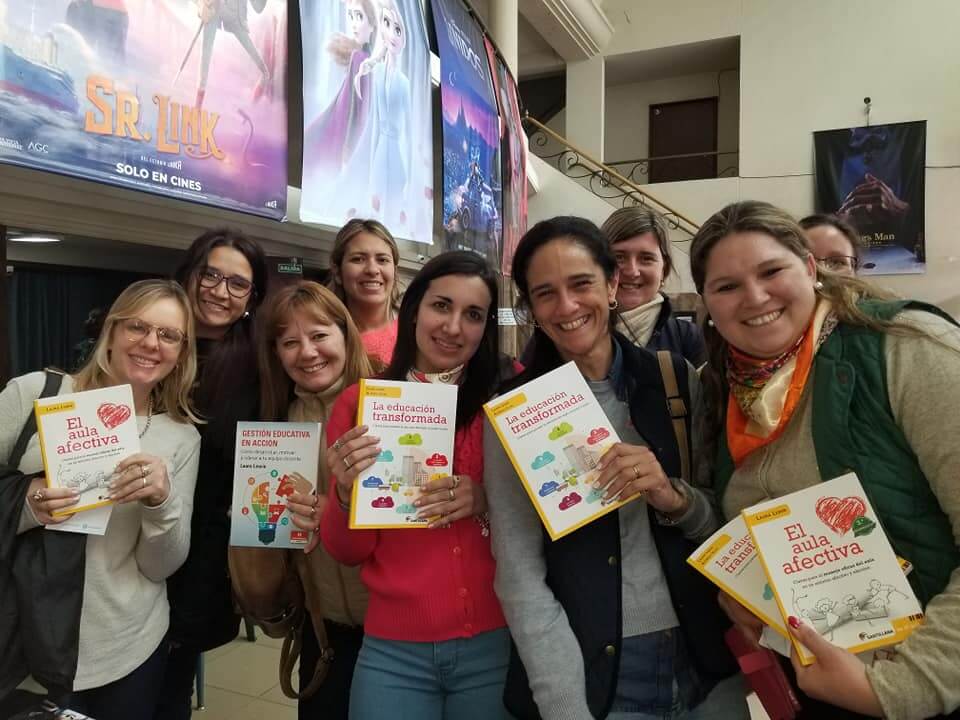
Fellow educators and admins enjoy several of Laura’s books
You currently train teachers and administrators. How did you make the transition from teaching kids to teaching educators?
As I was the director of my own English school, I would deliver teacher training sessions to my teachers, and very soon I opened that area to other teachers. One of the first seminars that I delivered was on coordinating successfully. This was about 20-something years ago, when there was not much on educational management—no careers, no books, no programs—not like we have today. Those were very successful programs, and I kept working with directors and then with educators, and I truly found my passion there.
What are some ways the global coronavirus pandemic has affected your work with educators?
Well, the global coronavirus pandemic has, of course, affected my work. Most of what I did before was to deliver teacher training sessions internationally. Because of the coronavirus, I had to put off trips to Mexico, Costa Rica, the Dominican Republic, Peru, and many other countries, but I am now working virtually and have the opportunity to teach through e-learning.
Nowadays, it’s not very difficult to get to online audiences. Of course, it means that you need to change the way you do it since teaching online differs from teaching in person, so you need to change your expectations and the way in which you interact with people. But quite honestly, since the coronavirus started, I was able to develop different areas and ideas, so that is keeping me very busy.
You gave a TEDx Talk about how education must be focused on learning, not on passing classes. Can you tell us more?
My 2018 TEDx Talk was about parents who don’t succeed in trying to motivate their kids to study. Basically, when we focus too much on grades, students and our children will just try to pass because that is what we are telling them they should do. We’re saying, “Pass your class,” and asking, “What grade did you get on that test?” But when we focus on learning, the situation changes.
You see, when students focus on passing, they only study because of others—the teacher or the parents—and they will only remember the information for a few days. They study, they take the test, they pass, and a few days after that, they forget all about it. But when they study because they want to learn, because they are interested in the subject matter, they remember the content much longer. So, basically what I was talking about is to be careful when trying to motivate your students, relying on external “motivators” such as passing or a given grade, since you might not get what you expect.
You are the author of several books for teachers and administrators, “Anita and Ben” and “Strong and Happy.” Where do you get the ideas for your books?
Where I get ideas for my books beats me. I don’t know, honestly. I have written nine books and I still don’t know the answer to that. I get inspired by different situations or I feel that I want to talk and communicate some ideas, but when I sit down to write it’s very unusual that I already have the whole idea in my mind.
You know, a book is built one chapter after the other. I try to think about what I want to write about, I create the subtitle for that chapter, and then I start writing, and writing, and writing. And I don’t know, when I read it all together then, I like my books – I really like my books. And the good thing is, my readers like them, too!
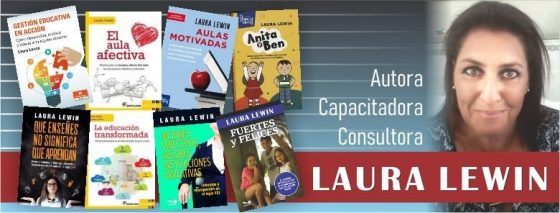
Some of Laura’s published books for educators, admin, parents, and kids
I think the reason behind that is that I can combine theory with practice and discussion questions and stories. There’s a lot of storytelling in my books, which are very optimistic. It doesn’t matter what I am talking about; it’s always very optimistic. “Anita and Ben” is a great book for children ages 6 to maybe 10, and it’s about developing a growth mindset. “Strong and Happy” is a book that I love. It’s about raising kids. It’s about understanding that kids are unique and not trying to change them, and it’s about being the best parents we can be and understanding that the “perfect parent does not exist.” The book is a bestseller in Argentina, and I loved writing it.
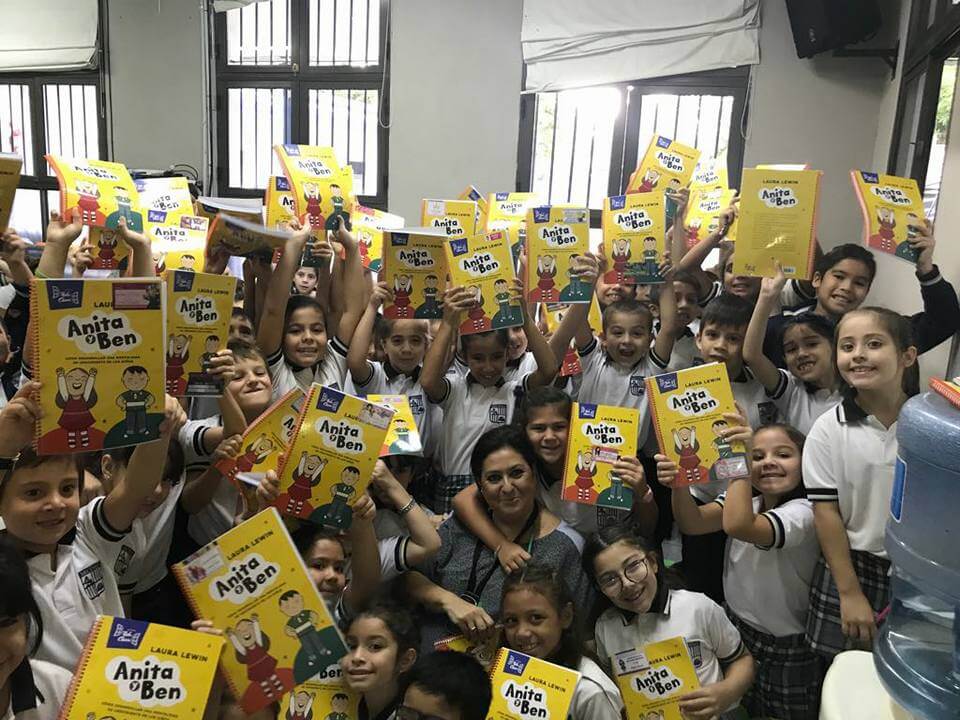
Students with Laura’s book, “Anita and Ben”
You recently wrote an article for the newspaper, ÁMBITO, about the opportunities coronavirus can open in the field of education. Can you share your thoughts on that?
An increase in student responsibility
Well, the coronavirus is indeed providing us with great opportunities in the field of education. To start with, students are studying in a very natural way for them, in a virtual environment. They are responsible for their own learning process. They have to self-manage their studies, they have to make good use of their time, they need to prioritize activities, and they need to plan.
Stronger relationships
We also see teachers and parents working together in harmony, something that we have never seen before. We see parents becoming very close to their children and observing how they learn, what frustrates them, what motivates them, and where they get stuck and responding to that accordingly. I think this is a true education transformation.
Now, the challenge is for us is to see how we’re going to deepen these changes so that we can have long-lasting effects. But clearly, the big challenge is for the government to see how to close the gap – the terribly sad situation of those who have no access to technology and are left behind.
You have taught hundreds of workshops in South America, the United States, and Europe. How did you get started doing that?
Well, as I mentioned, I started delivering workshops for my own teachers, and then little by little I opened those workshops up to other people. Little by little, maybe somebody saw me and contacted me to deliver the same talk or give another seminar at their institution, and then some publishing houses saw what I was doing. They thought it was interesting and that I had something worth saying, so the ball started rolling.
Then, Cambridge University Press hired me some years ago as an international teacher trainer, and that meant working in new countries like Mexico, Costa Rica, Panama, and many others. And then, maybe some people who saw me in those workshops took me to their institutions and some of them were working in the government, so I started working for the government, and that’s how it all got started, I guess.
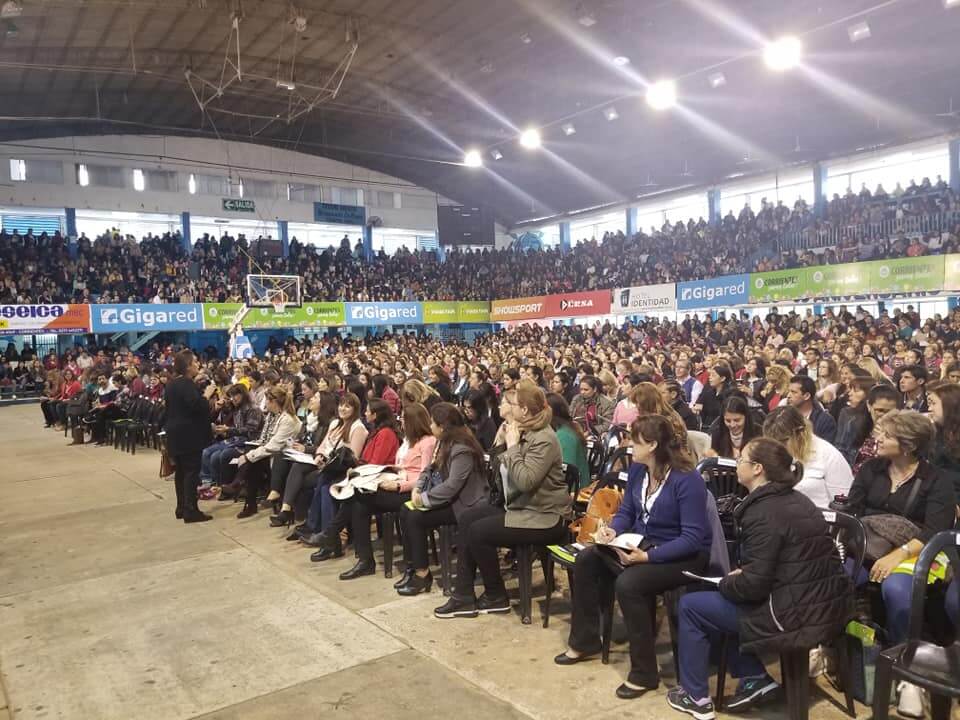
Laura, giving a talk to educators
You also host online teacher workshops for very large groups. How do you manage that many people virtually, and what is your advice for teachers suddenly having to do this?
Foster a new set of abilities
Well, teaching online is, of course, different from teaching in a classroom, but when you love what you do, and when students want to learn, I think it doesn’t really matter if you do it through a computer or in a classroom. Of course, you need to develop different kinds of abilities: the ability to teach for impact, deliver shorter lessons, and grab people’s attention. It’s not a question of where you gather, either in a classroom or through a computer, but rather of “how” you do it. This is how you get the connection so students don’t have to listen to you, but want to listen to you.
Connect to your students emotionally
I am currently delivering workshops for large groups of people, and I find it to be exactly the same. If you can find a way to engage students, it doesn’t matter how many students you have out there. Of course, the more you have, the more you will have to find possibilities for them to work in groups so that they can be active.
You don’t want passive students just listening to you. We know that students learn more by doing than by listening or watching, and in my workshops and when I teach online, I never go more than 90 minutes straight. I see that people are engaged not only cognitively but also emotionally, and I think that is the secret to teaching online: the connection that you create with your students.
Is there one workshop you’re particularly proud of, and if so, why?
I am very proud of all of my workshops. When you work a lot and you hate what you do, that will stress you out. But when you work a lot and you love what you do, you will be very passionate about it. So, I think that passion is the secret behind success in many, many cases.
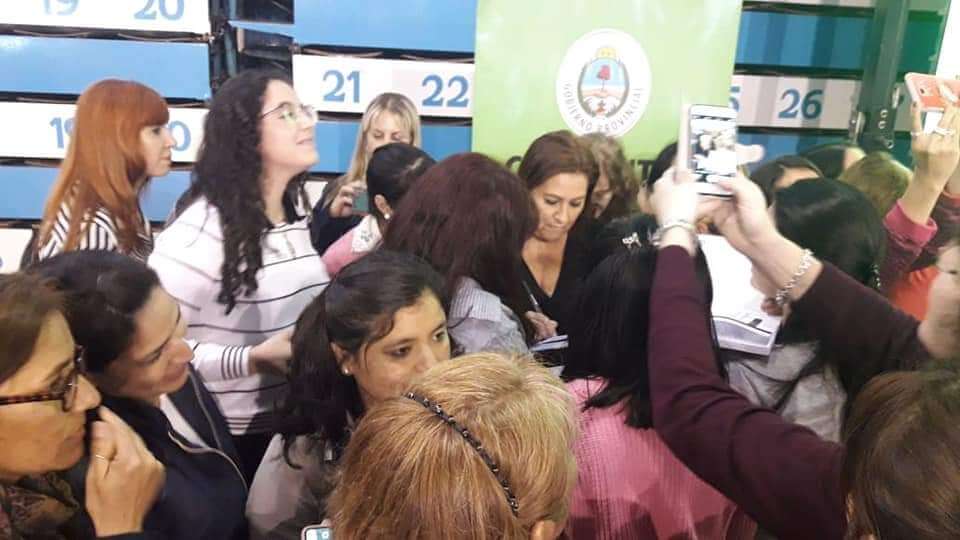
Laura signing her books at one of her talks
I love delivering workshops for administrators and directors. That is maybe one of the things that I like doing the most. Then, there’s another seminar that I deliver often. It’s based on the idea that if you want your students to learn, stop teaching, meaning that many times teachers focus too much on themselves, what they teach, and how they teach it, rather than on their students. So, when we focus on our students, what they need in order to learn, and how they learn, I think that the connection is stronger and students are able to learn much, much more.
What advice do you have for English teachers having a hard time transitioning from the classroom to teaching online during this time?
Step out of your comfort zone
You know, teaching online is a lot like swimming. You cannot learn to swim reading a book; you need to dive into a swimming pool and do it. Teaching online is pretty much the same. You need to get started somehow and understand that it might require getting out of your comfort zone but that it can be a lot of fun too. And once you get used to it, the sky is the limit. There are so many platforms. And there are so many resources out there. Plus, it’s better for the students because we’re talking in their own language. But again, interaction, flexibility, empathy, and connection are huge words. We have to humanize the screen. We must make the connection.

Educators, admins, and parents participate in one of Laura’s talks
Don’t give up
When our students were born, Google already existed, so these students never have a problem with computers. They don’t think about it; they just use them. And when teachers start using those resources without thinking too much but just enjoying what they are doing, the magic happens. So, again, try, try, and try, and if you don’t succeed at first, try again, and eventually, you will get the hang of it.
Can you tell us about some current teacher training projects you are working on?
I have already finished a book, which is called “Implosionando el Sistema Educativo” (which in English is, “Imploding the Educational System”), which will come out in a few weeks. I am also developing online workshops for some international publishing houses. I am working on some projects in Chile as well. So, I am very busy in this coronavirus time. I am also writing articles for newspapers, and I am on TV regularly in Argentina, talking to parents and teachers.
I think that all crises can be seen as opportunities. We’ve heard this many, many times before, but I think that these are extraordinary times for extraordinary people doing extraordinary things. So, I do hope that we’ll get inspired and that we can move on, in spite of the circumstances. We are educators, and educators teach, regardless of the circumstances. Hang in there. This, too, shall pass. Our kids are watching us and learning from us. Let them see our best.






